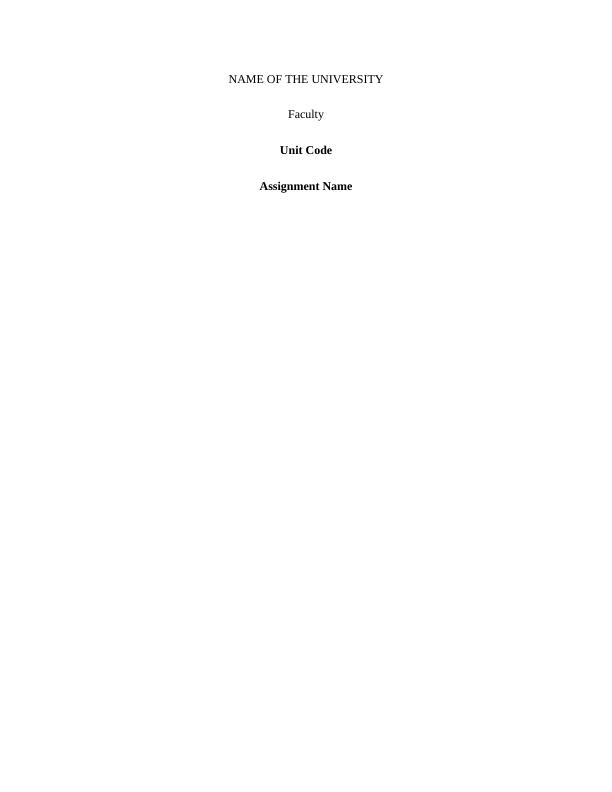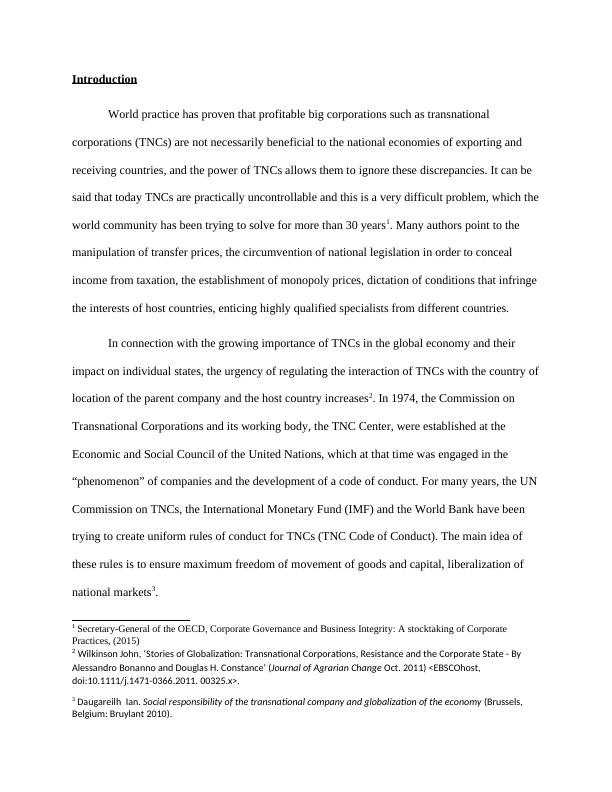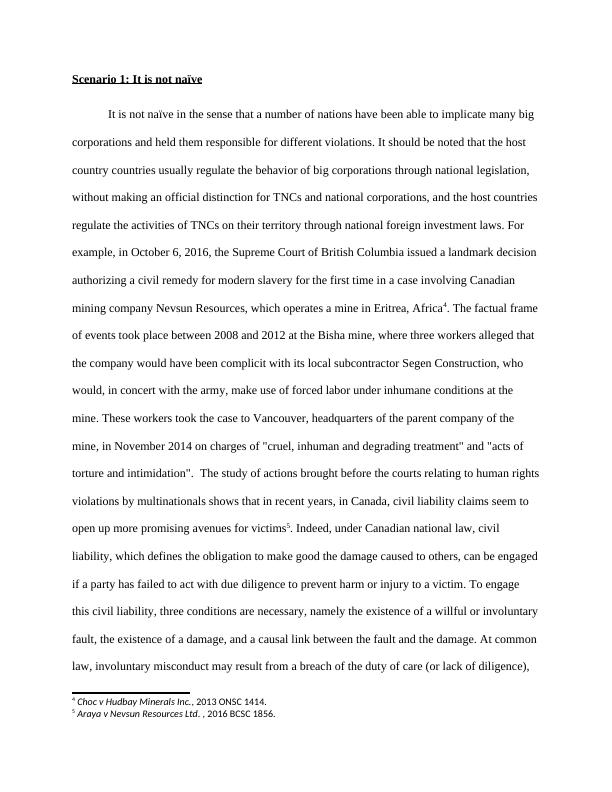Regulating Transnational Corporations: Challenges and Realities
Added on 2023-06-03
13 Pages3285 Words327 Views
NAME OF THE UNIVERSITY
Faculty
Unit Code
Assignment Name
Faculty
Unit Code
Assignment Name

Prepared by:
Student ID
Date
Student ID
Date

Introduction
World practice has proven that profitable big corporations such as transnational
corporations (TNCs) are not necessarily beneficial to the national economies of exporting and
receiving countries, and the power of TNCs allows them to ignore these discrepancies. It can be
said that today TNCs are practically uncontrollable and this is a very difficult problem, which the
world community has been trying to solve for more than 30 years1. Many authors point to the
manipulation of transfer prices, the circumvention of national legislation in order to conceal
income from taxation, the establishment of monopoly prices, dictation of conditions that infringe
the interests of host countries, enticing highly qualified specialists from different countries.
In connection with the growing importance of TNCs in the global economy and their
impact on individual states, the urgency of regulating the interaction of TNCs with the country of
location of the parent company and the host country increases2. In 1974, the Commission on
Transnational Corporations and its working body, the TNC Center, were established at the
Economic and Social Council of the United Nations, which at that time was engaged in the
“phenomenon” of companies and the development of a code of conduct. For many years, the UN
Commission on TNCs, the International Monetary Fund (IMF) and the World Bank have been
trying to create uniform rules of conduct for TNCs (TNC Code of Conduct). The main idea of
these rules is to ensure maximum freedom of movement of goods and capital, liberalization of
national markets3.
1 Secretary-General of the OECD, Corporate Governance and Business Integrity: A stocktaking of Corporate
Practices, (2015)
2 Wilkinson John, ‘Stories of Globalization: Transnational Corporations, Resistance and the Corporate State - By
Alessandro Bonanno and Douglas H. Constance’ (Journal of Agrarian Change Oct. 2011) <EBSCOhost,
doi:10.1111/j.1471-0366.2011. 00325.x>.
3 Daugareilh Ian. Social responsibility of the transnational company and globalization of the economy (Brussels,
Belgium: Bruylant 2010).
World practice has proven that profitable big corporations such as transnational
corporations (TNCs) are not necessarily beneficial to the national economies of exporting and
receiving countries, and the power of TNCs allows them to ignore these discrepancies. It can be
said that today TNCs are practically uncontrollable and this is a very difficult problem, which the
world community has been trying to solve for more than 30 years1. Many authors point to the
manipulation of transfer prices, the circumvention of national legislation in order to conceal
income from taxation, the establishment of monopoly prices, dictation of conditions that infringe
the interests of host countries, enticing highly qualified specialists from different countries.
In connection with the growing importance of TNCs in the global economy and their
impact on individual states, the urgency of regulating the interaction of TNCs with the country of
location of the parent company and the host country increases2. In 1974, the Commission on
Transnational Corporations and its working body, the TNC Center, were established at the
Economic and Social Council of the United Nations, which at that time was engaged in the
“phenomenon” of companies and the development of a code of conduct. For many years, the UN
Commission on TNCs, the International Monetary Fund (IMF) and the World Bank have been
trying to create uniform rules of conduct for TNCs (TNC Code of Conduct). The main idea of
these rules is to ensure maximum freedom of movement of goods and capital, liberalization of
national markets3.
1 Secretary-General of the OECD, Corporate Governance and Business Integrity: A stocktaking of Corporate
Practices, (2015)
2 Wilkinson John, ‘Stories of Globalization: Transnational Corporations, Resistance and the Corporate State - By
Alessandro Bonanno and Douglas H. Constance’ (Journal of Agrarian Change Oct. 2011) <EBSCOhost,
doi:10.1111/j.1471-0366.2011. 00325.x>.
3 Daugareilh Ian. Social responsibility of the transnational company and globalization of the economy (Brussels,
Belgium: Bruylant 2010).

Scenario 1: It is not naïve
It is not naïve in the sense that a number of nations have been able to implicate many big
corporations and held them responsible for different violations. It should be noted that the host
country countries usually regulate the behavior of big corporations through national legislation,
without making an official distinction for TNCs and national corporations, and the host countries
regulate the activities of TNCs on their territory through national foreign investment laws. For
example, in October 6, 2016, the Supreme Court of British Columbia issued a landmark decision
authorizing a civil remedy for modern slavery for the first time in a case involving Canadian
mining company Nevsun Resources, which operates a mine in Eritrea, Africa4. The factual frame
of events took place between 2008 and 2012 at the Bisha mine, where three workers alleged that
the company would have been complicit with its local subcontractor Segen Construction, who
would, in concert with the army, make use of forced labor under inhumane conditions at the
mine. These workers took the case to Vancouver, headquarters of the parent company of the
mine, in November 2014 on charges of "cruel, inhuman and degrading treatment" and "acts of
torture and intimidation". The study of actions brought before the courts relating to human rights
violations by multinationals shows that in recent years, in Canada, civil liability claims seem to
open up more promising avenues for victims5. Indeed, under Canadian national law, civil
liability, which defines the obligation to make good the damage caused to others, can be engaged
if a party has failed to act with due diligence to prevent harm or injury to a victim. To engage
this civil liability, three conditions are necessary, namely the existence of a willful or involuntary
fault, the existence of a damage, and a causal link between the fault and the damage. At common
law, involuntary misconduct may result from a breach of the duty of care (or lack of diligence),
4 Choc v Hudbay Minerals Inc., 2013 ONSC 1414.
5 Araya v Nevsun Resources Ltd. , 2016 BCSC 1856.
It is not naïve in the sense that a number of nations have been able to implicate many big
corporations and held them responsible for different violations. It should be noted that the host
country countries usually regulate the behavior of big corporations through national legislation,
without making an official distinction for TNCs and national corporations, and the host countries
regulate the activities of TNCs on their territory through national foreign investment laws. For
example, in October 6, 2016, the Supreme Court of British Columbia issued a landmark decision
authorizing a civil remedy for modern slavery for the first time in a case involving Canadian
mining company Nevsun Resources, which operates a mine in Eritrea, Africa4. The factual frame
of events took place between 2008 and 2012 at the Bisha mine, where three workers alleged that
the company would have been complicit with its local subcontractor Segen Construction, who
would, in concert with the army, make use of forced labor under inhumane conditions at the
mine. These workers took the case to Vancouver, headquarters of the parent company of the
mine, in November 2014 on charges of "cruel, inhuman and degrading treatment" and "acts of
torture and intimidation". The study of actions brought before the courts relating to human rights
violations by multinationals shows that in recent years, in Canada, civil liability claims seem to
open up more promising avenues for victims5. Indeed, under Canadian national law, civil
liability, which defines the obligation to make good the damage caused to others, can be engaged
if a party has failed to act with due diligence to prevent harm or injury to a victim. To engage
this civil liability, three conditions are necessary, namely the existence of a willful or involuntary
fault, the existence of a damage, and a causal link between the fault and the damage. At common
law, involuntary misconduct may result from a breach of the duty of care (or lack of diligence),
4 Choc v Hudbay Minerals Inc., 2013 ONSC 1414.
5 Araya v Nevsun Resources Ltd. , 2016 BCSC 1856.

End of preview
Want to access all the pages? Upload your documents or become a member.
Related Documents
Australian corporate law has evolved through various stageslg...
|10
|2538
|16
Institutional and Cultural Factors in International Human Resource Managementlg...
|9
|2678
|80
Process Of International Businesslg...
|4
|781
|61
Global Communication Skills Assignmentlg...
|9
|2678
|19
Managing Global Marketing: Assignmentlg...
|14
|672
|95
Monopolies and Anti-Competitive Practice Legislation in UKlg...
|6
|582
|89
